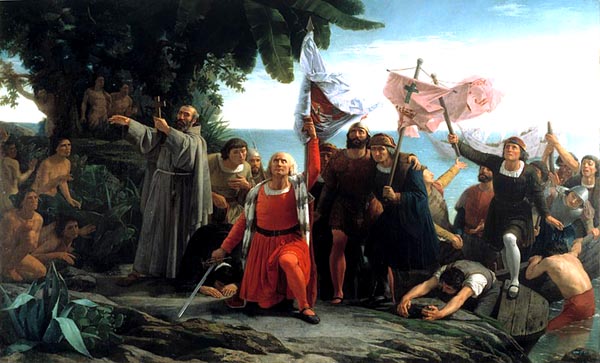 |
| The landing of Columbus (Wikipedia) |
Note: No, Columbus was not "Italian," he did not "discover America," and he didn't even touch the North American continent!
Get Ready: Do you think Columbus's "discovery" was overall a good thing or a bad thing?
When I was a boy, the first holiday on the calendar after the start of school in September was Columbus Day, celebrated on October 12. On that day we commemorated the efforts of the intrepid Italian sailor, Captain Christopher Columbus, who--at the behest of King Ferdinand and Queen Isabella of Spain--sailed his three small ships, the Nina, the Pinta, and the Santa Maria, across the Atlantic, and thus discovered America in 1492.
Okay, let's start with what's true: There were three ships by that name (probably), and they did sail under Columbus at the request of the Spanish monarchs in 1492.
But Columbus and his crew did not "discover America"--for a number of reasons.
First off, there were already people living in America. We now call them as a group "Native Americans," but they were actually a huge number of distinct peoples--estimates run to a thousand tribes or more, with over 50 distinct linguistic groups, in North America alone. It was Columbus who called the local peoples "Indians," in the mistaken belief he had reached Asia. His "discovery" would be like someone walking into your living room uninvited and saying, "Look! I found a house!"
Secondly, where Columbus landed was not the modern United States, or even on the North American landmass. He landed on an island in the Caribbean Sea.
Third, even if he had landed in North America proper, he would not have been the first European to have done so. It is well established that Norsemen--sometimes called Vikings--reached the shores of eastern Canada about 500 years before Columbus, though they did not establish permanent settlements. (Another candidate for "First Arrival" is Saint Brendan, briefly mentioned in Lesson #05-033.)
A fourth mistaken belief is that Columbus was "Italian." Italy did not become a unified country until the middle of the 19th century; Columbus was from Genoa, and would then properly be called "Genoese" or "Genovese."
Today, Columbus Day--celebrated on the Second Monday of October--has become a topic of controversy. Some Native American groups feel that what Columbus did was wrong, and five states--Alaska, Oregon, Hawaii, South Dakota, and Vermont--do not celebrate it at all*, though the latter three have alternative celebrations with names like "Native American Day" and "Indigenous Peoples' Day."
--------
--------*Such was the status when I wrote this in 2017. In the four brief years since, things have changed considerably. As of August 2021, these 11 (or 12) states either have no commemoration, or have one dedicated to Native Americans: Alaska, Florida, Hawaii, Maine, New Mexico, Oregon, South Dakota, Vermont, Washington, Wisconsin, and parts of California. Furthermore, Iowa and Nevada do not celebrate it as an official holiday, but their governors may issue proclamations. Others, such as California and Texas, continue to recognize the day in some form, but do not offer pay to state government workers for leave on that day.
Read more: https://en.wikipedia.org/wiki/Columbus_Day
Practice: Match the term to its definition below:
- behest
- distinct
- indigenous
- intrepid
- landmass
- linguistic groups
- peoples
- settlements
- thus
- unified
- clearly separate
- colonies; newly-formed communities
- a command; an order
- brought together as one
- native
- a continent
- tribes speaking the same language
- tribes, nations, or other such groups
- therefore; as a result
- fearless; brave
Answers are in the first comment below.
Submitted to the Shenzhen Daily for May 25, 2017


Answers to the Practice: 1. c; 2. a; 3. e; 4. j; 5. f; 6. g; 7. h; 8. b; 9. i; 10. d
ReplyDelete